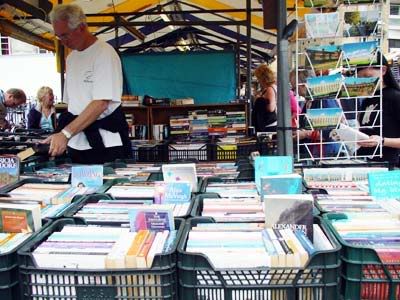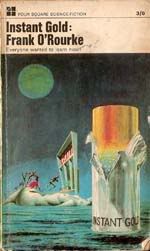 On those occasions when I leave the draughty old fen to visit Cambridge, I like to go to the market. Having been a drugs worker, I have to bite my tongue when passing paraphernalia for using cannabis, in order to get to the really important bits: the book stalls.
On those occasions when I leave the draughty old fen to visit Cambridge, I like to go to the market. Having been a drugs worker, I have to bite my tongue when passing paraphernalia for using cannabis, in order to get to the really important bits: the book stalls.I'v
 e found many a gem there. Something I love is the smell of the book, especially if it's been on somebody's shelf for a long time. And you can come across titles that you might never think to order on, say, Amazon (as much as I value this site), because you can't stand and browse through a book's pages on the internet. Yes, you can look through the text, but you can't stand with the sounds and smells of the marketplace around you and flick through a book to see whether it's got that quality that you can't name, but is essential to enjoy a book.
e found many a gem there. Something I love is the smell of the book, especially if it's been on somebody's shelf for a long time. And you can come across titles that you might never think to order on, say, Amazon (as much as I value this site), because you can't stand and browse through a book's pages on the internet. Yes, you can look through the text, but you can't stand with the sounds and smells of the marketplace around you and flick through a book to see whether it's got that quality that you can't name, but is essential to enjoy a book.One such that I found recently was a novel (or novella) by Frank O' Rourke called "Instant Gold". O' Rourke, born in Colorado, was known for writing Western novels (things beloved of my Dad), but this is called science fiction. I looked at the back page:
PROFIT UNLIMITED
1 can of powder: cost $500
add
8 ounces of sea water: free
result
16 ounces of gold: value $560
My curiosity was piqued, and it's not often that you see a 125-page novel these days, unless it's Mills & Boon.
It's a wonderful piece of writing that lends credence to the old saw that sometimes good things come in small packages. Basically, one day in a residential area of San Francisco, a shop opens up offering "instant gold" in cans, obtainable through the recipe above. The establishment, whose heads are referred to not by name but as "Security", "FBI", etc, try to stop the proprietors, but since they are not selling gold but instant gold, there's nothing to be done. They are threatened and fêted in equal measure. The outcome is predictable, perhaps, but O' Rourke presents it with a lyrical hilarity that is all too rarely seen now:
The rush for California became a stampede reminiscent of forgotten homestead raffles and land races. Tractors were left running in Iowa fields, malingerers leaped from hospital beds, Detroit assembly lines faltered, brides spent lonely wedding nights; fifty thousand people entered the state each and every twenty-four hours, clogging the highways, glutting the freeways, creating a gasoline problem that strained the resources of the giant oil companies...
Remembering that the book was written in 1964, O' Rourke's description of the international scene shows a remarkable degree of observation and prescience, which I read with a sense of "would it had been so...":
People stormed U.S. embassies and consulates, begging for visas. A rumor spread that instant gold shops would open in West Berlin; on Sunday morning two million East Germans rose up, tore down the wall with their bare hands, and crossed over, their ranks swollen by eighty-two percent of the East German Army. In Viet Nam the Communists and Liberals declared an end to war, ripped down the no-dancing signs, and awaited the rumored arrival of the first instant gold ship. De Gaulle made good his threat and withdrew France from the world; the French peasantry formed eighteen thousand village pools and dispatched representatives by sea and air to San Francisco; the British Prime Minister at last proclaimed peace in his time and signed the agreements joining England with the Common Market. Australia and New Zealand, ignoring the jettisoning, flew their Prime Ministers to San Francisco...The directors of the South African gold mining syndicate addressed desperate pleas to Washington, begging the federal government to stop the vicious flooding of an honourable market. The long-expected came to pass in Cuba. A group of inner-circle patriots quietly removed Castro to the nearest asylum, reorganised their government, and sent wires to the American sugar companies, begging forgiveness and throwing wide the ravished gates. Seventy-seven percent of the Russian cadre in Cuba renounced Soviet citizenship and took the Cuban oath of allegiance. The Vatican was reported making a survey of ceilings, statues, and other artifacts in dire need of regilding; at existing prices heaven and edict could wait."Sometimes O' Rourke sounds like a lecturer who's a little too fond of his own voice, after the manner of Peter van Greenaway; but his dealings in the relationship between language and logic might not lend themselves to any other style, and are not the major part of the book. As it turns out, action and dialogue are exquisitely balanced, and tempered with a hint of a love story. The moral is subtly-presented in such a way that it comes through most strongly after you've put the book down for the last time - that the compulsively acquisitive tend to become their own nemeses.
Many books are described as "laugh-out-loud" that are anything but. This is one of the very few books I've read which actually did make me laugh, which unsettled the cat somewhat (sorry, Magus). I laughed especially at the very end, but then the meaning hit me like a punch.
Perhaps it's not for nothing that President Paul Kruger of the South African Republic (Transvaal), upon hearing of the discovery of gold in the hills, is siad to have cried: "For God's sake, keep it in the ground!"











No comments:
Post a Comment
Please feel free to leave a comment - Frugal Dougal.